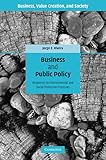Business and public policy responses to environmental and social protection processes
Material type: TextSeries: Business, value creation, and societyPublication details: New York Cambridge University Press 2010Description: xvi,249pISBN:
TextSeries: Business, value creation, and societyPublication details: New York Cambridge University Press 2010Description: xvi,249pISBN: - 9780521897815
- 658.4083 22 RI-B
- HF1008 .R58 2010
 Print
Print
| Item type | Home library | Collection | Call number | Status | Date due | Barcode | |
|---|---|---|---|---|---|---|---|
 Print
Print
|
OPJGU Sonepat- Campus Main Library | General Books | 658.4083 RI-B (Browse shelf(Opens below)) | Available | 112564 |
Includes bibliographical references.
Machine generated contents note: List of figures; List of tables; Foreword; Acknowledgments; Publication acknowledgements; 1. Introduction; 2. Business responses to the protective policy process in the US; 3. Country context and the protective policy process-business response relationship; 4. Firm level characteristics and business responses to environmental/social protection demands; 5. Is greener whiter? Resistance strategies by the US ski industry; 6. Is greener whiter yet? Resistance or beyond compliance by the US ski industry?; 7. Institutional pressures and proactive environmental protection: evidence from the Costa Rican hotel industry; 8. Chief executive officers and proactive environmental protection: evidence from the Costa Rican hotel industry; 9. Certified beyond compliance and competitive advantage in developing countries; 10. Conclusion; References; Index.
"It is increasingly common for businesses to face public policies and government regulation that demand some form of environmental or social protection. These protective public policies have grown in number, complexity, and stringency over the last few decades, not only in industrialized countries but also in the developing world. In this book, Jorge Rivera presents a new theoretical framework for understanding the relationship between protective public policies and business compliance. This framework explains different levels of business compliance in terms of three different factors: the link between the stages of protective public policies and different levels of business resistance, the effect of country context, and the effect of firm-level characteristics. The second part of the book supports and elaborates on this framework by presenting empirical studies that examine two voluntary environmental programs: the US ski industry's Sustainable Slopes Program and the Certification for Sustainable Tourism in Costa Rica"--
There are no comments on this title.

